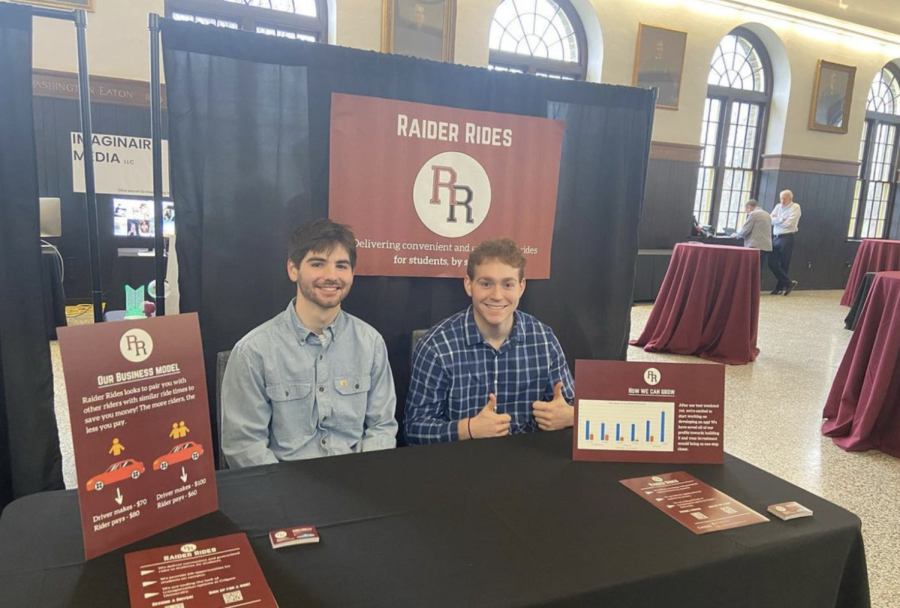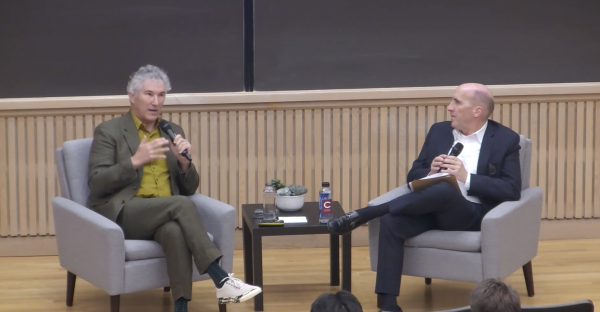TIA Program Hosts Entrepreneur Weekend
Thirty Colgate-affiliated entrepreneurs met in the Hall of Presidents (HOP) on Saturday, April 9 for Colgate’s annual Entrepreneurship Weekend (E-Weekend). Arriving as early as 9 a.m., Colgate students and alumni alike set up shop around 30 plastic tables, laying out their startups’ products and proposal presentations, ranging from CBD sweet treats, to colorful sunglasses, to screens projecting video game designs. Some entrepreneurs had spent upwards of four years developing their programming while others had not yet completed one year under Thought into Action (TIA), an entrepreneurial program.
Groups tabled from 11 a.m. to 3 p.m., interrupted only at 1 p.m. with a Shark Tank-esque pitch competition on the HOP’s main stage. What followed were pitches from six pre-selected Colgate affiliated groups, all vying for a $5,000 prize pool.
The stage featured four alumni ventures, including Maua Organics, which provides natural hair care products; First Impressions Nails, which gives customers the tools needed to apply acrylic nails at home; and SUNLOOPS, which makes colorful sunglasses and other accessories apt for college party-goers.
At this time, Colgate also spotlighted their alumnus choice for Entrepreneur of the Year, Sian-Pierre Regis ‘06, who is the director of “Duty Free,” a documentary which examines economic insecurity and aging in America. The event also featured two student ventures; Confucius, a Chinese language learning app, and ShotQuality, a betting model program. Confucius was the newest venture on stage. After working under TIA for one year, the group is considered a “100-level venture.”
The Confucius app was borne out of idle time provided by the pandemic and a love for Chinese, according to seniors Jocelyn Shilakes and Bennett Morris. The app, which follows the motto “Language learning, simplified,” features patent-pending three-sided flashcards, which offer a word in English, Pinyin and Chinese characters.
Their HOP stage presentation was simultaneously exciting and stressful, according to Shilakes.
“While we were excited to share our product with the greater Colgate community, we knew that more people were going to see, hear and interact with the Confucius product than ever before,” Shilakes said. “In that sense, we felt like we were in a little bit of a vulnerable position.”
Shilakes spends hours each week in the library studying Chinese characters with her close friend and co-founder Morris, and both began studying the language in middle school. COVID-19 challenged their Chinese studies, taking from them the in-class experience of practicing their calligraphy.
In the midst of the pandemic, Shilakes and Morris thought of fellow Chinese learners, particularly those who had less experience with the language or who were less adept at learning the language without the careful instruction of professors or teachers. Thus, the wireframes for Confucius were borne.
“It was an exercise in creating tools that we knew students could benefit from that we haven’t had,” Shilakes said.
Shilakes and Morris credit both one another and their TIA mentors for their successful launch of the startup and their unique invitation to pitch on HOP’s stage.
Junior Jeffery Yang, founder of the startup Optic Games Development, pitched on the opposite side of HOP, and also lauds his mentors and the TIA program for helping him in his video game development.
Yang previously attended the TIA event as a first-year student and has since worked for video game startups, but felt that beginning his own would allow him to exercise more creativity and autonomy. His proposal for Optic Games, which features artfully made characters and unique storylines, is the product of two years of work.
“I definitely think it’s a good experience to go through, especially if you’re interested in business or entrepreneurship,” Yang said.
One major component of E-Weekend was a system of faux-investment that all Colgate community members attending the event were encouraged to participate in. Every person who entered HOP for the event was given an envelope with a handful of “iggys,” or clear plastic chips. Each individual was instructed to hand out the chips to startups which they felt most-deserved their investment. The top iggy earners won cash prizes ranging from $250 to $1000.
First-year Katie Maratea gave most of her iggys to both Confucius and Optic Games. As a French major, she found Confucius especially appealing. The character designs on Optic Games, particularly one of a cat-boy with white hair, were striking according to Maratea.
“The fact that the Confucius entrepreneurs were able to use their own work to show people how to study Chinese was really cool,” Maratea said. “I really liked seeing this because I have a pretty big appreciation for languages.”
Amongst passion projects like Confucius and Optic games, some E-Weekend and TIA ventures addressed the basic needs and struggles of the Colgate community. One such project is Raider Rides, begun by junior Jordan Klein. Last year, Klein’s roommate needed an emergency ride to the Syracuse airport.
“My other roommate, Jason, said he would drive him and then practice got in the way and they all couldn’t drive him,” Klein said. “So it was all up to me to get him a ride in an hour, and I was pretty upset … it ruined my day. Then I thought, ‘There’s got to be a way for someone to schedule a ride in an hour’ … and I was like, ‘Why don’t I create that? Like, it seems pretty easy.’”
Raider Rides, another 100-level venture, now has around 35 registered drivers. They hope to soon launch an app and expand their driving range from Colgate to the Syracuse airport and add a more expansive map of regions.
Between Shilakes and Morris’s Confucius, Yang’s Optic Games and Klein’s Raider Rides, TIA and E-Weekend are spaces that cater to a diverse assortment of interests and needs within the Colgate community. Yang encourages Colgate students and alumni to add their passions to this pot of diversity by joining TIA and E-Weekend in the future.
“Don’t be afraid if you’re not a traditional entrepreneur,” Yang said. “TIA needs more creative ventures. It is always the first couple. Don’t think they won’t take your creative venture seriously – they absolutely will. There’s room for all sorts of ventures. Apply as soon as you can.”





